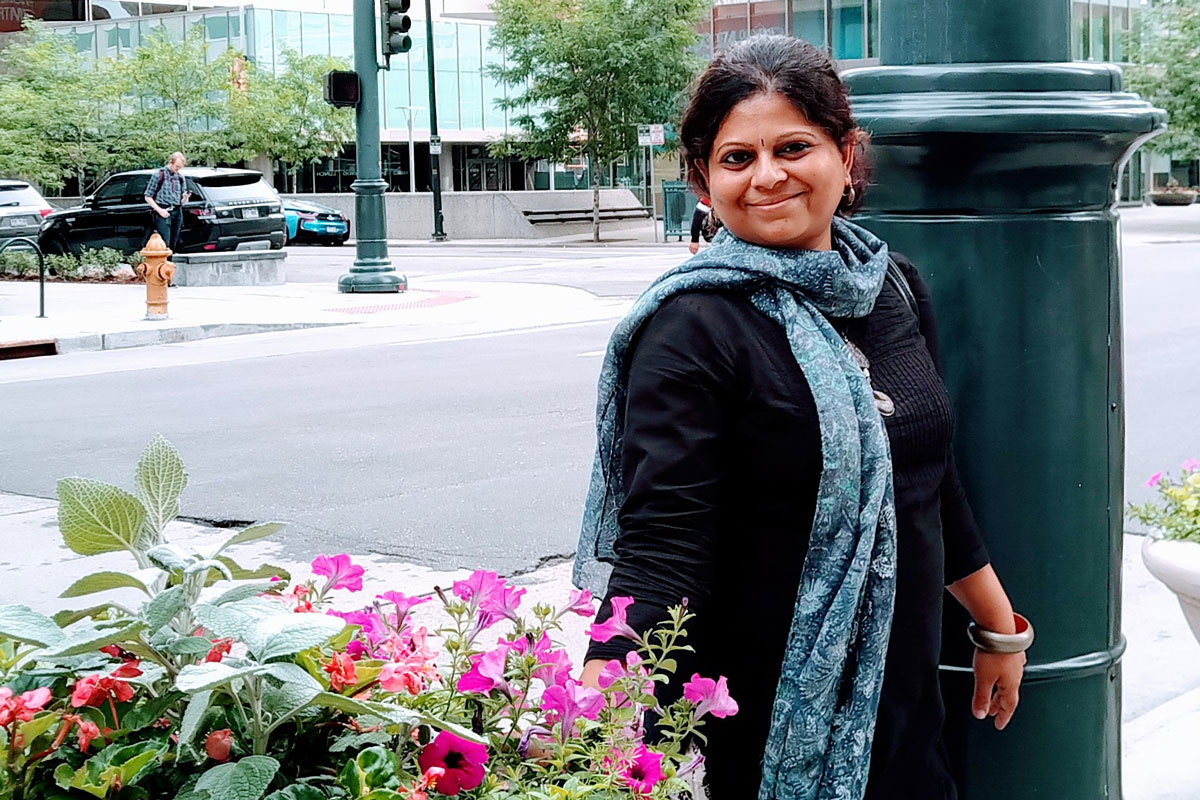Introducing Indrani Chakraborty, Child Protection and Anti-Trafficking Specialist
GFC’s Child Protection and Anti-Trafficking Specialist, Indrani Chakraborty, supports grassroots organizations in India that are tackling child trafficking and hazardous labor in their home communities.
In this new interview, she shares a more intimate look at her background, and why she believes in GFC’s mission.

Indrani, can you tell us about where you’re from and about your background?
I was born and brought up in Durgapur, a steel township in the state of West Bengal, India. I completed my undergraduate and master’s degrees at the Department of Social Work, Visva Bharati University, Santiniketan.
I started my career in Sanlaap India, which is a development organization that works against gender injustice and violence against women and children. The primary focus of Sanlaap is to fight against trafficking of women and children for commercial sexual exploitation, sexual abuse, and forced prostitution.
After Sanlaap, I shifted to other development organizations, which include community-based, national, and international organizations.
More than 21 years of experience in the development sector provided me the opportunity to work in various thematic areas like child rights, child protection, unsafe migration, trafficking, gender-based violence, HIV and AIDS, women’s rights, and rights-based microfinance.
What’s your favorite childhood memory?
A family trip to Andaman, which was my first experience at a sea beach. I collected a lot of corals, which are still with me.
What drew you to this line of work, and to GFC?
During my postgraduate social work, I went to a red-light area in an industrial belt named Lachipur Dhal, in West Bengal, India, to collect data for my dissertation paper on the situational analysis of women in prostitution. It was my first visit to a red-light area, which was an eye-opener for me. I had never seen such insecure and unsafe childhood.
The red-light area was divided into two segments: one was for women affected by leprosy, and the other was for women and girls forced into prostitution generally. The area was leprosy prone (though the reason was unknown to me). The women who were affected by leprosy used to shift from the general segment to the area specified for leprosy patients. Astonishingly, most of them still used to practice prostitution, though their income was lower than others.
Through the course of interaction with the women and an NGO that worked in this red-light area, I heard the term “trafficking,” as a large percentage of women were the victims of it.
Then I decided that, after completion of my course, I would work with such an organization to prevent human trafficking and intergenerational prostitution. So, I started work with Sanlaap. Indrani Sinha was my mentor; she was the pioneer in anti-trafficking work, not only in West Bengal but also across India.
I worked in both source and destination areas. Prevention of trafficking in the source area, with the collaboration of community-based organizations, was one of the major focuses.
I believe that building leadership among organizations and creating community-based child-protection mechanisms can bring change to the community.
I was attracted to GFC because I believe in the core values of GFC, which lay a foundation for bringing positive impact to the lives of children and young people.
What do you think will be the most challenging part of your job? What will be the most satisfying?
Working with people in the community is both challenging as well as satisfying. Understanding the needs and inherent values of the community and building trustworthy relationship is challenging. On the other hand, I will get the opportunity to apply my professional skills in a new way, be a part of innovation, and watch progression over time, which will be the most satisfying.
Why do you believe GFC’s work is important?
GFC encourages community ownership and local leaders who will influence policies related to child and youth rights, which will ensure the sustainability of this effort. This will help create a world where all children and youth are safe, strong, and valued.
#FunFacts About Indrani
What was your favorite toy growing up?
A nice doll gifted by my dad.
What did you want to be when you grew up?
An ice cream taster!
What’s the weirdest thing you’ve ever eaten?
A horrible-looking fried fish in Bangkok!
Do you have a pet peeve?
People who can never be punctual and make me run late.
If you could have any superpower, what would it be?
To travel wherever I would like to!
What is one of your favorite places that you have traveled to?
New Zealand.